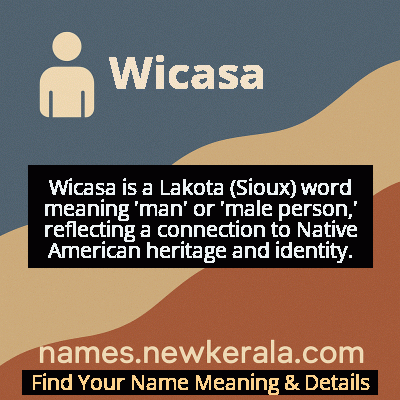Wicasa Name Meaning & Details
Origin, Popularity, Numerology Analysis & Name Meaning of Wicasa
Discover the origin, meaning, and cultural significance of the name WICASA. Delve into its historical roots and explore the lasting impact it has had on communities and traditions.
Name
Wicasa
Gender
Male
Origin
American
Lucky Number
2
Meaning of the Name - Wicasa
Wicasa is a Lakota (Sioux) word meaning 'man' or 'male person,' reflecting a connection to Native American heritage and identity.
Wicasa - Complete Numerology Analysis
Your Numerology Number
Based on Pythagorean Numerology System
Ruling Planet
Moon
Positive Nature
Diplomatic, friendly, artistic, empathetic.
Negative Traits
Over-sensitive, moody, indecisive, prone to self-pity.
Lucky Colours
Green, cream, white.
Lucky Days
Monday.
Lucky Stones
Pearl, moonstone.
Harmony Numbers
1, 3, 4.
Best Suited Professions
Diplomats, mediators, caregivers, artists.
What People Like About You
Cooperative spirit, friendliness, artistic talent.
Famous People Named Wicasa
Wicasa Wakan
Spiritual Leader
Preserved sacred Dakota ceremonies and healing traditions
Wicasa Oyate
Community Elder
Taught Dakota language and traditions during cultural revival
John Wicasa
Educator and Activist
Founded Dakota language immersion programs
Name Variations & International Equivalents
Click on blue names to explore their detailed meanings. Gray names with will be available soon.
Cultural & Historical Significance
The name reflects the Dakota value system that emphasizes wisdom gained through lived experience, respect for elders, and the importance of spiritual balance in daily life. Historically, being named Wicasa indicated the family's hopes that the child would grow into a person of substance who would contribute meaningfully to their community's wellbeing and cultural continuity. During the challenging periods of colonization and forced assimilation, the concept of Wicasa became even more crucial as these individuals helped preserve cultural knowledge and maintain community cohesion against tremendous external pressures.
Extended Personality Analysis
Individuals named Wicasa are typically perceived as thoughtful, introspective, and possessing natural leadership qualities. They often exhibit a calm demeanor and measured approach to problem-solving, reflecting the wisdom implied by their name. These individuals tend to be excellent listeners who value different perspectives before forming opinions or making decisions. Their natural inclination toward reflection often makes them sought-after advisors in both personal and professional contexts.
Wicasa-named individuals frequently demonstrate strong ethical compasses and a deep sense of responsibility toward their communities. They may show particular aptitude for teaching, counseling, or spiritual guidance roles, often displaying patience and empathy that others find comforting. While they can be reserved in unfamiliar situations, they become articulate and persuasive communicators when discussing topics they're passionate about, particularly those related to justice, tradition, or community welfare. The weight of their name's meaning often inspires them to pursue paths that benefit others rather than seeking personal glory, embodying the Dakota concept of being a good relative to all beings.
Modern Usage & Popularity
In contemporary times, Wicasa remains a meaningful choice primarily within Dakota/Lakota communities and among families seeking to honor Native American heritage. While not appearing on mainstream baby name popularity charts, its usage has seen a modest increase during the Native American cultural renaissance of recent decades. The name is particularly favored by families committed to language preservation and cultural continuity, often chosen by parents who want their children to carry forward important cultural values. Modern bearers of the name often become educators, cultural ambassadors, or community leaders, living up to the name's significant meaning. In urban settings, the name serves as a powerful connection to indigenous identity and values, helping maintain cultural ties even when geographic connections to traditional homelands are distant. Social media and digital platforms have also helped raise awareness of traditional Native names like Wicasa, though it remains a distinctive choice that carries deep cultural responsibility and expectation.
Symbolic & Spiritual Meanings
Symbolically, Wicasa represents the bridge between earthly existence and spiritual understanding, embodying the concept of lived wisdom rather than academic knowledge alone. The name carries connotations of the sacred sage plant used in purification ceremonies, representing cleansing, protection, and spiritual clarity—qualities expected of those who bear this significant name. Metaphorically, Wicasa symbolizes the accumulation of experience transformed into guidance—much like how a river stone is smoothed over time by flowing water—suggesting that true wisdom comes through patient endurance and reflection on life's journey. It represents the ideal of balanced leadership that considers both practical needs and spiritual values, never sacrificing one for the other. The name also symbolizes cultural memory and the transmission of knowledge across generations, serving as a living connection to ancestral ways of knowing that have survived despite historical challenges. In a broader sense, Wicasa embodies the universal human quest for meaning and the respected role of those who help others find their path through compassionate guidance and deep understanding.

